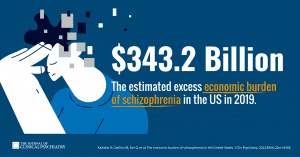Sharp commentary from Dawn Velligan, and Sanjai Rao, MD published earlier this week in The Journal of Clinical Psychiatry discussed the staggering toll schizophrenia takes on the individual patient and society as a whole. As the authors made clear, the impact of this psychiatric disorder steals life years from patients and carries a high economic cost.
Here are five eye opening facts Velligan and Rao highlighted about the global burden of schizophrenia.
- Schizophrenia affects about one percent of the global population (approximately 20 million people) and ranks among the top 10 causes of global disability because symptoms such as clinical depression, hallucinations and delusions make daily life challenging.
- In the US, the average potential life lost for each person with the condition is 28.5 years. Patients with schizophrenia are at high risk for suicide as well as other medical conditions including heart disease, liver disease, and diabetes.
- Patients between the ages of 25 and 54 years old are hit the hardest by the debilitating symptoms of schizophrenia. As the authors noted, this corresponds to the most productive years in most individuals’ lives.
- In the US, the indirect costs of schizophrenia such as lost productivity, coupled with extensive medical care, carried a $281.6 billion price tag in 2020 alone. Last year another investigation on the economics of schizophrenia reported an even higher cost. (See infographic below.)
- For each person diagnosed with schizophrenia at age 25, the total lifetime cost to the economy is approximately $3.8 million or $92,000 per patient per year.

Velligan is a professor in the department of psychiatry and co-chief of the division of schizophrenia and related disorders at the University of Texas. Rao is an associate clinical professor of psychiatry and associate residency training director with the University of California, San Diego.
To learn more about schizophrenia and earn CME, check out these educational programs for psychiatrists, psychiatry PAs, and psychiatry NPs.


